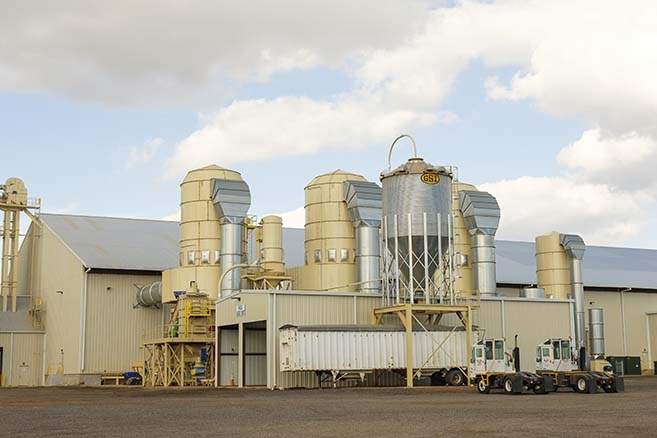Coastal Growers files for bankruptcy protection while seeking buyer

By DON FLETCHER
News Staff Report
Coastal Growers LLC, which had high hopes when it began operating an 85-million-dollar-plus, high-tech peanut processing plant here more than two years ago, has filed for Chapter 11 bankruptcy protection and is looking to sell the business as an ongoing commercial entity.
Jess Nicholas, executive director of Escambia County Industrial Development Authority, was in town for last week’s SEEDS Act check presentation and said he had just learned of the filing before reaching city hall for the presentation.
Nicholas agreed the situation seems glum for the local farmers’ cooperative that owns the company but said it doesn’t mean the peanut plant will be completely shutting down, although some employees who survived a massive layoff in June have reported that their employment officially ended Saturday, November 30.
“Chapter 11 is for reorganization, not liquidation,” Nicholas said. “After a period of a few months, we should be aware of the next step in the plan for, possibly, ‘the business formerly known as Coastal Growers.’ I’m not sure how many employees were left, or what will happen to those employees but [Coastal Growers workers] have been cutting the machinery on, keeping it maintained, during the [bankruptcy filing] process.”
State Sen. Greg Albritton and State Rep. Alan Baker each said during the SEEDS Act check presentation they had not previously heard about the bankruptcy petition, which was filed earlier that day in U.S. Bankruptcy Court, Southern District of Alabama, in Mobile.
Albritton said he is baffled by the problems the shelling plant has had since its February 2022 grand opening, saying “whether [the bankruptcy filing] is true or not, the real question is: They had such a good start, how did they get there from that?”
Coastal Growers Chief Financial Officer Holly Johnson said the decision to seek Chapter 11 protection during the reorganization was designed to “maximize the value” of the shelling plant. That will make it more attractive to a major processor, such as Con-Agra or Birdsong.
“This was not an easy decision, but it is the right one for the future of Coastal Growers,” Johnson said in a press release. “We are optimistic about the outcome and remain steadfast in our commitment to supporting farmers and securing success for generations to come.
“Our fundamental purpose has always been to deliver value back to our grower-owners. This reorganization is a necessary step to strengthen our financial position and ensure the success of the shelling plant.”
That could be a tough job. According to Bloomberglaw.com, only about 10 percent of Chapter 11 filers successfully reorganize themselves and continue doing business.
The agricultural cooperative — owned by area farmers who provide most of the peanuts processed at the Atmore plant — was designed to serve as “a vital hub for shelling, storing, and shipping peanuts” from the U.S.’s strongest peanut-growing area. Coastal Growers promised 100 new jobs within a year and exceeded that employment goal.
Then things began to head south.
Last year’s drought-driven price spike forced a wedge between farmer-owners, some of whom refused to deliver their peanuts to the plant of which they were part-owner, despite contracts that were signed prior to the market jump.
United States Department of Agriculture (USDA) officials suspended Coastal Growers LLC’s warehouse license in early May, barring the company from warehousing any agricultural products that were not already warehoused when the suspension went into effect.
Before any change in ownership is consummated, there are several items that must be dealt with, including a claim by Network America Lines, a New Jersey shipping company to which Coastal Growers owes nearly $150,000 in past due fees for shipping the plant’s peanuts to foreign markets.
The federal “maritime contract” lawsuit, which was filed July 17 in U.S. District Court, Southern District of Alabama, claims the local company owes the shipper $149,200. An online search of court records did not show any other legal actions had been filed in federal court against the peanut processor through November 28.
A maritime contract lawsuit refers to a case filed in a federal court regarding a dispute arising from a contract related to maritime activities, such as shipping, boat ownership, or other commercial transactions on navigable waters, where federal maritime law applies and governs the dispute. Essentially, if a contract dispute occurs on the sea or involving maritime commerce, it can be brought to a federal court under admiralty jurisdiction.
Several state and federal grants were involved in the initial financing of the peanut plant. Atmore City Clerk Becca Smith said the city is not on the hook for any grant money the project received, unlike the $180,000 the city had to repay when aerospace manufacturer Brown Precision failed to meet its employment goals after setting up shop here with a promise of at least 35 high-paying jobs within a year.
Brown Precision managed to create only 17 permanent full-time positions and one part-time position, and the city had to return 90 percent of the estimated employment impact grant.
“The city is not responsible for any grants that might have to be repaid on this project,” Smith said of the Coastal Growers situation.
Nicholas said economic development officials, left mostly in the dark about the plant’s operations, will have to wait and see what happens as the reorganization plan proceeds.
“It’s not as bad as it could be,” he said. “From our standpoint, not much has changed. At this point, the process has to be worked through. I’m not sure if the name will change or not. I’m just happy it’s a reorganization, not a liquidation.”
